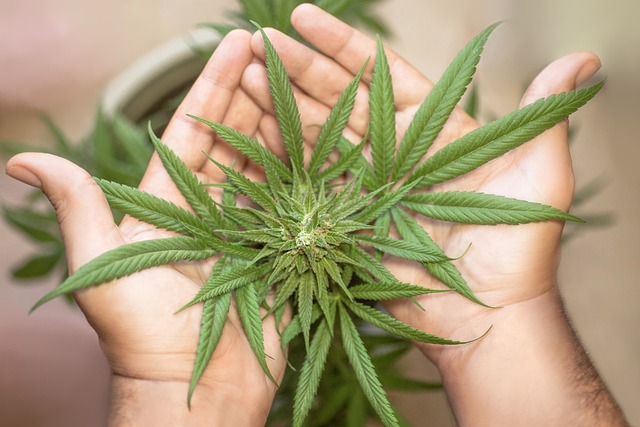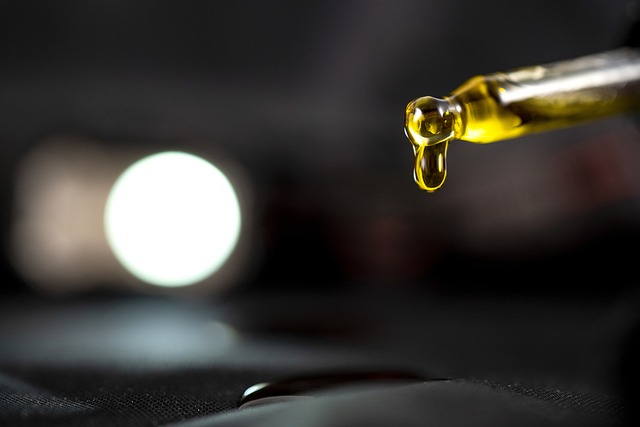2023 marked a significant milestone for New Mexico's health sector with the rise of THCA flowers as a key addition to its wellness offerings. THCA, a non-psychoactive cannabinoid found in hemp and cannabis plants, has become legally accessible in New Mexico due to its therapeutic benefits, which include anti-inflammatory and neuroprotective properties. Unlike its psychoactive counterpart THC, THCA offers these advantages without altering one's mental state. The state's progressive cannabis laws have paved the way for local cultivators to produce THCA-rich flowers, providing residents with a legal and beneficial alternative for pain relief, improved sleep, and mood enhancement. New Mexico's favorable legal environment has also made it a hotspot for research into THCA's potential health benefits, positioning it as a leader in the cannabis science sector. The state's commitment to this innovative approach to health and wellness underscores its dedication to embracing new therapeutic frontiers, particularly with THCA legal in New Mexico. This has led to increased scientific investigation and personal testimonials that are expanding our understanding of how THCA can be integrated into health and well-being routines.
In the ever-evolving landscape of cannabinoid research, THCA—tetrahydrocannabinolic acid—has emerged as a subject of growing interest, particularly within the wellness community of New Mexico. As the legal status of THCA in this state continues to pave the way for innovative health solutions, scientific exploration into its non-psychoactive properties offers a promising new chapter for those seeking natural alternatives for wellness. This article delves into the myriad benefits of THCA flowers, shedding light on how they can complement your health regimen without intoxication and how they differ from other cannabinoids. With a focus on New Mexico’s unique position in the legal landscape of THCA, we explore the entourage effect, dosing guidelines, and the importance of sourcing high-quality THCA legally. Join us as we navigate the science behind THCA, its role in natural wellness, and the potential applications that extend beyond health and wellness, all while understanding the regulatory framework that governs its safety and efficacy.
- ThCA Flower Benefits Unveiled: A New Chapter for Wellness in New Mexico
- THCA Legal Status in New Mexico: Paving the Way for Innovative Health Solutions
- Understanding THCA: The Non-Psychoactive Cannabinoid with Potential Health Advantages
- The Science Behind THCA Flower: How It Differs from Other Cannabinoids
- THCA's Role in Natural Wellness: A Closer Look at Its Properties
- Exploring the Therapeutic Properties of THCA Flowers in New Mexico
ThCA Flower Benefits Unveiled: A New Chapter for Wellness in New Mexico

2023 has marked a pivotal moment in New Mexico’s wellness journey with the emergence of THCA flowers as a natural therapeutic agent. The legal landscape in New Mexico, favorable to cannabinoids, has opened doors for residents to explore alternative health options. THCA, or tetrahydrocannabinolic acid, is the raw form of THC found in hemp and cannabis plants, known for its potential wellness properties without the psychoactive effects typically associated with THC. The state’s progressive approach towards cannabis legislation has paved the way for local cultivators to produce and distribute THCA-rich flowers, allowing individuals to harness the unique benefits of this non-intoxicating cannabinoid.
Advocates and users in New Mexico are increasingly turning to THCA flowers for their wellness potential, citing a range of effects from pain relief to improved sleep and mood enhancement. The anti-inflammatory properties of THCA are particularly noteworthy, as they offer a natural alternative for managing chronic inflammation and discomfort without the need for prescription medications. Additionally, studies suggest that THCA may have neuroprotective qualities, which could play a role in safeguarding brain health. As research continues to evolve, New Mexico’s embrace of THCA flowers stands as a testament to the state’s commitment to innovative wellness practices and the empowerment of individuals to explore holistic options for their health and well-being.
THCA Legal Status in New Mexico: Paving the Way for Innovative Health Solutions

New Mexico has emerged as a pioneering state in the realm of cannabis research and legislative reform, particularly with regard to THCA, or Tetrahydrocannabinolic Acid, a non-psychoactive precursor to THC found in raw cannabis. The legal status of THCA in New Mexico has been shaped by legislation that recognizes its therapeutic potential. Unlike its psychoactive counterpart THC, THCA is legal under the state’s medical cannabis program without a specific registry card for conditions where THC is permitted. This legal distinction allows for a broader scope of research and exploration into the health benefits of THCA, which proponents claim may offer anti-inflammatory, neuroprotective, and antiemetic properties.
The state’s progressive stance on cannabis research has paved the way for innovative health solutions, with New Mexico leading the charge in understanding the full spectrum of cannabinoids’ effects on human health. The legislative clarity provided by the state’s laws enables researchers to delve into the potential benefits of THCA without the legal ambiguity that exists in many other jurisdictions. This has attracted attention from both scientists and patients interested in the therapeutic possibilities of cannabinoids like THCA, positioning New Mexico as a hub for cutting-edge research and development in this burgeoning field.
Understanding THCA: The Non-Psychoactive Cannabinoid with Potential Health Advantages

THCA, or tetrahydrocannabinolic acid, is a cannabinoid found naturally in the Cannabis sativa plant. Unlike its well-known counterpart THC, which is psychoactive, THCA exists in raw cannabis or cannabis that has not been heated or decarboxylated. This non-psychoactive compound holds promise for various health advantages and has garnered attention within the wellness community. Research suggests that THCA may offer anti-inflammatory, analgesic, and neuroprotective properties, potentially aiding in conditions such as arthritis, multiple sclerosis, and neurological diseases.
The legal landscape of cannabinoids is evolving, with states across the country adopting different regulations. In New Mexico, for instance, THCA-rich products are legally accessible to residents under specific state laws. These regulations allow individuals to explore the potential therapeutic benefits of THCA without the psychoactive effects associated with its decarboxylated form, THC. As such, the interest in THCA flower, which is high in THCA and low in THC, has surged among those seeking alternative health solutions. This has led to a burgeoning market for these products, with an increasing number of dispensaries offering strains specifically bred to be rich in this cannabinoid.
The Science Behind THCA Flower: How It Differs from Other Cannabinoids

Delta-9-tetrahydrocannabinolic acid (THCA) is one of the many cannabinoids found in the Cannabis sativa plant. Unlike its well-known counterpart, delta-9-tetrahydrocannabinol (THC), THCA exists naturally in hemp and cannabis plants before being decarboxylated to produce THC through heat or light exposure. This distinction is significant as THCA interacts with the body’s endocannabinoid system differently than its psychoactive form, THC. The scientific community has been exploring the potential therapeutic properties of THCA, which include anti-inflammatory, neuroprotective, and anti-nausea effects without the intoxicating side effects associated with THC.
Research suggests that THCA may offer a broader range of benefits due to its interaction with the CB1 and CB2 receptors in the endocannabinoid system. While THC primarily binds to CB1 receptors found predominantly in the brain, THCA is believed to interact more strongly with CB2 receptors, which are abundant in the immune system, offering potential therapeutic benefits for various conditions. In New Mexico, where the legal landscape for cannabis and hemp derivatives has been progressive, THCA flowers have gained popularity as a non-psychoactive alternative for those seeking the potential health benefits of cannabinoids without the ‘high’. This has led to an increase in research and development aimed at harnessing the unique properties of THCA, further contributing to the understanding of its effects compared to other cannabinoids.
THCA's Role in Natural Wellness: A Closer Look at Its Properties

Delta-9 tetrahydrocannabinolic acid, commonly known as THCA, is a non-psychoactive compound found in the cannabis plant that has garnered attention for its potential wellness benefits. As research continues to unfold, THCA is being recognized for its role in natural wellness practices. Found predominantly in raw cannabis plants, THCA’s properties suggest it may offer therapeutic effects without the psychoactive impact associated with its decarboxylated form, THC. In New Mexico, where the legal landscape has embraced the use of cannabis for both medicinal and adult-use, THCA flower, which contains high levels of this cannabinoid, is increasingly being explored for its wellness properties. Consumers are turning to THCA flowers as a natural alternative to manage conditions such as chronic pain, inflammation, and anxiety, due to its anti-inflammatory and neuroprotective effects. The legality of THCA in New Mexico allows for research and experimentation with this cannabinoid, offering insights into its potential role in natural wellness regimens. As interest grows, the state’s regulatory framework ensures that consumers have access to products derived from this compound while maintaining safety and efficacy standards. With a focus on understanding THCA’s effects through scientific study and personal anecdotes, it’s clear that this cannabinoid holds promise for those seeking natural methods to support their well-being.
Exploring the Therapeutic Properties of THCA Flowers in New Mexico

In New Mexico, the therapeutic properties of THCA flowers have garnered significant attention within the realm of alternative medicine and cannabinoid research. THCA, or tetrahydrocannabinolic acid, is the non-psychoactive precursor to THC, the primary psychoactive component found in cannabis. With New Mexico’s progressive stance on medical marijuana, THCA flowers have emerged as a legal alternative for those seeking the potential health benefits of cannabinoids without the high associated with THC. These flowers are rich in THCA due to their raw, uncured state, which preserves the acidic form of the compound. Patients and consumers interested in exploring the potential wellness applications of THCA can legally do so in New Mexico, as per the state’s legislative framework that supports medical cannabis use.
The benefits of THCA flowers are multifaceted, with research suggesting their potential to alleviate various ailments. Proponents claim that THCA may offer anti-inflammatory, neuroprotective, and analgesic properties, which could be beneficial for conditions ranging from chronic pain to neurological disorders. Furthermore, the non-psychoactive nature of THCA allows users to reap the therapeutic effects without the cognitive impairment often associated with THC. This aspect is particularly appealing for those who wish to maintain clarity and functionality throughout their day while managing pain or other symptoms. As such, THCA flowers have become a topic of interest for both medical professionals and patients in New Mexico, where the legal landscape supports the exploration of these promising compounds.
New Mexico’s forward-thinking approach to THCA flower’s legal status has opened a promising avenue for innovative health solutions, setting a precedent that may influence other regions. The exploration of THCA’s therapeutic properties within the state has revealed its potential as a non-psychoactive cannabinoid with distinct benefits. As research continues to unveil the science behind THCA, it becomes clear that this compound holds significant promise for wellness and natural health remedies. The collective findings from the studies conducted in New Mexico underscore the importance of ongoing investigation into the full spectrum of cannabinoids and their applications. With THCA now recognized as a legal option within the state, the path forward for those seeking alternatives to traditional treatments is marked with hope and the potential for enhanced well-being.
